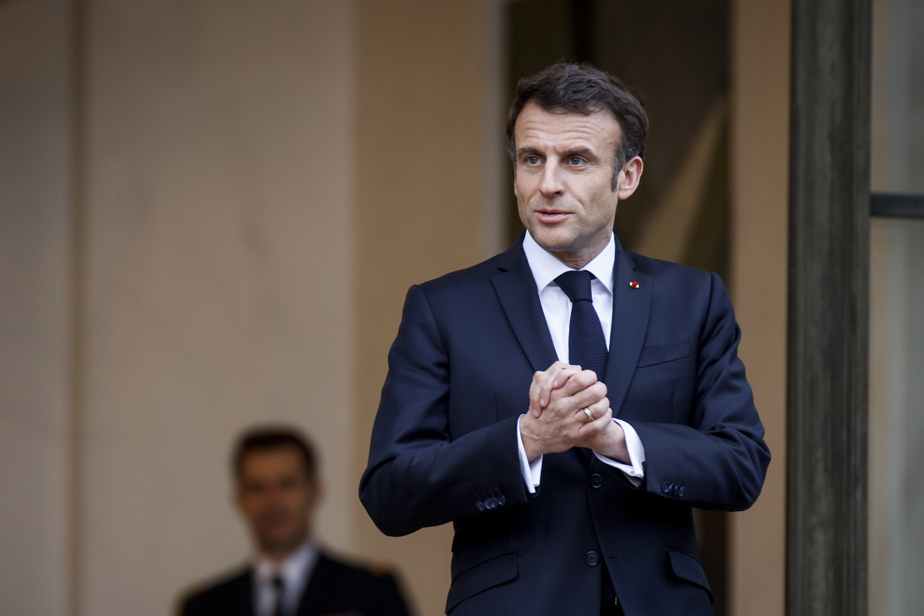(Savines-le-Lac) Emmanuel Macron presents Thursday in the Hautes-Alpes a long-awaited plan intended to improve the management of water, a resource threatened by global warming, ensuring that the pension crisis does not mean that “everything must stop”.
“There are 200 protesters: does that mean the Republic has to stop? The answer is no,” the head of state told reporters upon arriving on the shores of Lake Serre-Ponçon.
Among these demonstrators, chanting “Macron resignation”, “Macron manure, we are going to compost you” and waving flags of the CGT and the Confédération paysanne, surrounded by a cordon of gendarmes, two were arrested even before the arrival of the president .
“He diverts attention, he knows how to do it very well, from the real subjects,” said Julie, a 40-year-old protester from the neighboring town of Guillestre. “The problem of water is strange to come and treat it here, near the mountain stations, with the problem of snow cannons. »
The protest “does not prevent me from going to meet the French”, decided Emmanuel Macron, who has hardly moved from Paris since the presentation in January of the flagship reform of his second five-year term, which provides for the decline to 64 years of legal retirement age.
During one of his last outings, on February 25, at the Salon de l’Agriculture, he called for a “sobriety plan” on water, like that for energy.
The winter was particularly dry with a record 32 days without rain, which did not allow the water tables to be replenished, for 80% below normal on March 1.
Against the backdrop of the largest freshwater reservoir in Western Europe, Emmanuel Macron must roll out some fifty measures to reduce waste and make better use of water.
This plan was initially to be presented by Prime Minister Elisabeth Borne. But the president, who has made ecology, school and health his next priorities in an attempt to get out of the pension crisis, finally stole the show with a trip announced at the last moment.
These announcements come five days after the demonstration against the “mega-basin” of Sainte-Soline (Deux-Sèvres), punctuated by images of clashes of extreme violence between activists and the police.
Thousands of people had “simply come to make war”, commented Mr. Macron on Thursday, condemning “unacceptable violence”.
Climate experts anticipate a 10% to 40% decrease in water resources, hitherto abundant in the temperate climate of France, in the coming decades.
“There is very strong tension on water resources today,” hammered Thursday on BFM Business Aurélie Colas, general delegate of the Professional Federation of Water Companies.
According to her, the sector would need “over five years an additional 15 billion euros”, in order to adapt to climate change.
The government’s plan aims first to “prepare for next summer”, which could be “difficult if the weather situation does not improve”, indicates the presidency. But it also provides for “in-depth transformations to build suitable infrastructure” by 2030.
“All sectors – industry, agriculture, tourism and leisure, communities, individuals, etc. – will be mobilized, because it is indeed all French people who must be engaged to bring our water policy into a new era, ”underlines the Elysée.
One of the most scrutinized aspects will concern agriculture, the main consumer of water via irrigation (more than 2 billion m3), practiced only on 7% of cultivated areas, but most often in summer, when the resource is rare.
Attempts to conserve winter water in artificial reservoirs are turning environmentalists and part of the agricultural world against them, denouncing a “grabbing” of a “common good”.
In addition to increased storage solutions, the government is working on the development of crops that are more resistant to drought.
Another avenue, for agriculture as for sports fields or flushing: the reuse of wastewater, currently practiced for less than 1% of volumes in France compared to 8% in Italy, 14% in Spain and 85% in Israel.
The plan should also announce funding to better fight “against waste”. “Currently, about 1 in 5 liters of drinking water leaks”, and even one in two liters in certain territories, which do not have the means to repair ancient infrastructure, according to the executive.

